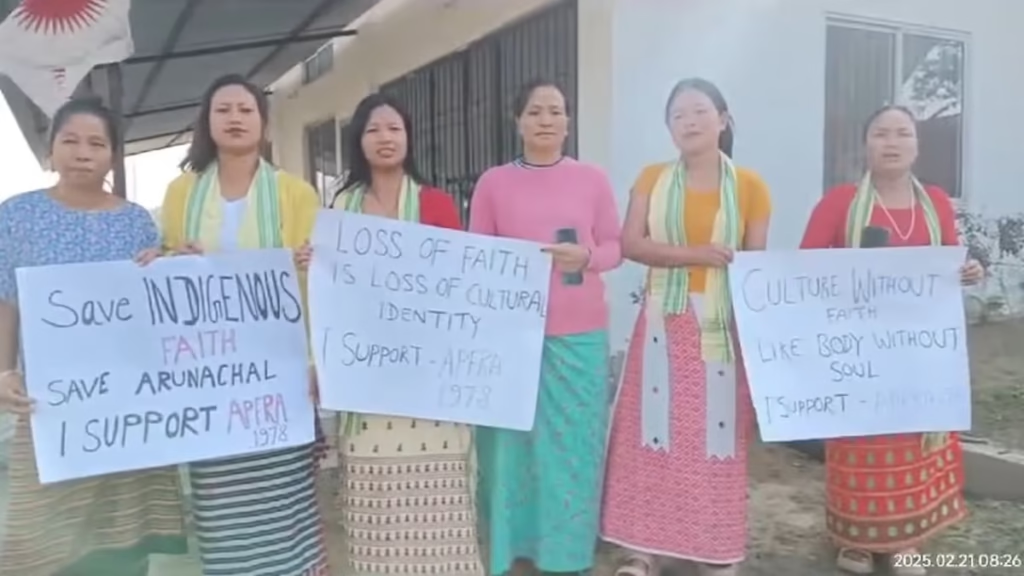The Donyi Polo believers of Nyedar Namlo, Holongi, in Papum Pare district, Arunachal Pradesh, have rallied in strong support of the Arunachal Pradesh Freedom of Religion Act (APFRA), 1978. The group is urging the state government to implement the law without delay, emphasizing its importance in preserving the indigenous faith and cultural identity of Arunachal Pradesh.
The demand comes amid an ongoing debate over APFRA 1978, as sections of the Christian community are calling for its repeal, citing concerns over religious discrimination. However, Donyi Polo supporters argue that the law is essential to safeguarding traditional religious practices and preventing coercive religious conversions.
Donyi Polo Believers Rally for APFRA 1978 in Arunachal Pradesh
The Donyi Polo community, which follows the indigenous faith of Arunachal Pradesh, has made a strong appeal to the state government, calling for the immediate implementation of the Arunachal Pradesh Freedom of Religion Act (APFRA), 1978.
Why Are Donyi Polo Believers Supporting APFRA 1978?
- Preservation of Indigenous Faith: The law is seen as a safeguard against external religious influences that could threaten indigenous religious traditions.
- Protection Against Religious Conversion: Supporters argue that APFRA 1978 is crucial to preventing forced or induced religious conversions in Arunachal Pradesh.
- Cultural Identity: The Donyi Polo community believes that implementing APFRA 1978 will help maintain and promote traditional beliefs and customs.
The rally in Holongi marks a major development in the ongoing religious debate, as indigenous faith groups assert their right to protect their ancestral religious practices.
Debate Over APFRA 1978: A Divided Opinion
The Arunachal Pradesh Freedom of Religion Act (APFRA), 1978, has sparked controversy over the years. While Donyi Polo believers and other indigenous faith followers support the law, the Christian community has opposed it, calling it discriminatory.
Arguments for APFRA 1978:
- Prevents coercive conversions by imposing legal restrictions on forced religious conversions.
- Preserves indigenous faiths, ensuring that local traditions remain intact.
- Protects cultural identity, allowing native spiritual practices to thrive.
Arguments Against APFRA 1978:
- Discriminatory in nature, as critics claim it unfairly targets the Christian community.
- Restricts religious freedom, limiting individuals’ right to choose their faith.
- Lack of implementation, as despite being enacted in 1978, the law has not been strictly enforced.
The opposing viewpoints highlight the complexity of religious diversity in Arunachal Pradesh and the need for balanced policymaking.
The Importance of APFRA 1978 in Arunachal Pradesh
The Arunachal Pradesh Freedom of Religion Act, 1978, was introduced to prevent forced religious conversions and protect indigenous faiths from external influences.
Key Features of APFRA 1978:
- Prohibits forced religious conversions through inducements or coercion.
- Imposes penalties for violating the act.
- Aims to safeguard traditional religious practices from external influence.
Supporters argue that implementing the law will strengthen traditional values and prevent cultural erosion. However, critics believe that strict enforcement may lead to misuse and harassment of religious minorities.
Impact of APFRA 1978 on Arunachal’s Religious Landscape
If APFRA 1978 is fully implemented, it could reshape the religious structure of Arunachal Pradesh.
Potential Outcomes:
- Strengthening Indigenous Religions – Donyi Polo and other traditional faiths may receive more legal backing to preserve their traditions.
- Possible Legal Challenges – Opposition groups may file petitions or protests against the act.
- Increased Religious Tensions – The Christian community and other religious groups may view the act as a tool for discrimination.
The state government faces the challenge of balancing religious freedom while protecting indigenous faiths.
Political and Social Reactions
The demand for APFRA 1978’s immediate implementation has sparked political discussions and social activism.
Government’s Position
- The Arunachal Pradesh government has yet to make a clear statement regarding the law’s enforcement.
- Political leaders are likely to weigh public opinion before making policy decisions.
Public Sentiment
- Indigenous faith followers strongly support APFRA 1978, believing it is a necessary measure.
- The Christian community remains opposed, arguing that it violates constitutional rights.
With both sides vocal about their concerns, Arunachal Pradesh may witness further debates, rallies, and legal actions.
Will APFRA 1978 Be Implemented?
The debate over APFRA 1978 is far from over. While Donyi Polo believers and other indigenous faith followers demand immediate implementation, opposition from the Christian community presents a major challenge.
The Arunachal Pradesh government must carefully evaluate the situation to ensure religious harmony while preserving cultural heritage. As the state navigates this sensitive issue, the outcome of the APFRA 1978 debate could set a precedent for religious policies in Arunachal Pradesh.

